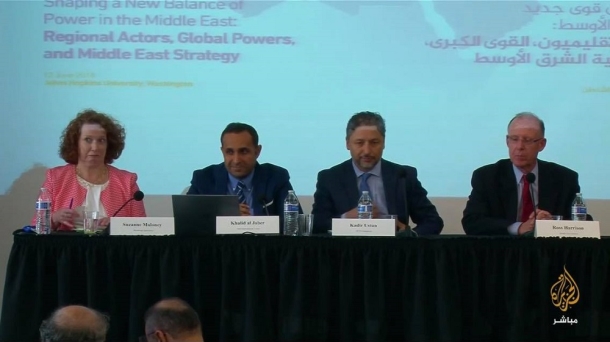
The Gulf and the Middle East are suffering a paroxysm of conflict involving virtually all the regional states as well as the United States, Russia and many different non-state actors. What dynamics are driving this chaos? What can be done to contain or reverse the damage? How might a new balance of power emerge? From this perspective, Al Jazeera Centre for Studies (AJCS) and Johns Hopkins University’s School for Advanced International Studies (SAIS) hosted an international conference entitled, “Shaping a New Balance of Power in the Middle East: Regional Actors, Global Powers, and Middle East Strategy”, on 12 June 2018 at SAIS. The one-day conference included several panels to address the dynamics of political geography in the Middle East, non-state actors and shadow politics, the sustainability of the balance of power, and the shifting roles of extra-regional powers.
Participants were scholars, analysts and diplomats from the Gulf, Middle East, North Africa, Turkey, the United States, including Daniel Serwer, Director of Conflict Management Program at SAIS; Ezzeddine Abdelmoula, Manager of Research, Al Jazeera Centre for Studies; Ross Harrison, Senior Fellow Middle East Institute; Kadir Ustun, Executive Director of SETA Foundation; Khalid al Jaber, Director of the Gulf International Forum; Suzanne Maloney, Deputy Director of Center for Middle East Policy and Energy Security and Climate Initiative at Brookings Institution; Paul Salem, Senior Vice President for Policy Research & Programs, Middle East Institute; Randa Slim, Director of Conflict Resolution and Track II Dialogues Program, Middle East Institute; Dror Michman, Visiting Fellow at the Foreign Policy Program and Center for Middle East Policy, Brookings Institution; Anour Boukhars, Associate Professor of International Relations at McDaniel College; Fatima Abo Alasrar, Senior Analyst at the Arabia Foundation; Ian Crispin Smith, Harvard Law School; Mohammed Cherkaoui, George Mason University Al and Jazeera Centre for Studies; Jamal Khashoggi, an independent writer; P. Terrence Hopmann, Professor of International Relations, SAIS, Conflict Management Program; Camille Pecastaing, Middle East Studies Program at SAIS; and Hussein Ibish of the Arab Gulf States Institute.
Opening remarks: Dr. Daniel Serwer and Dr. Ezzeddine Abdelmoula
Panel 1: Dynamics of Political Geography in the Middle East
Panel 2: Non-States Actors and Shadow Politics in the Middle East
Panel 3: New Balance of Power